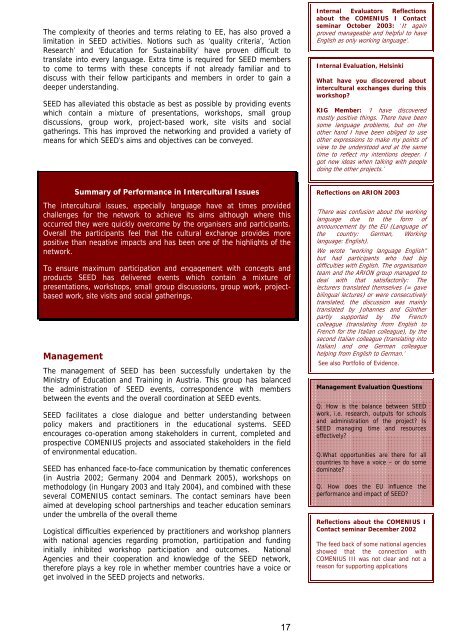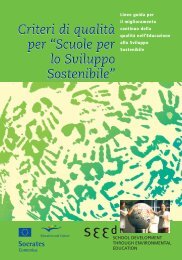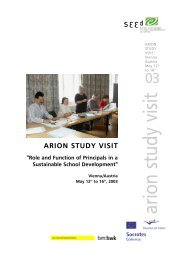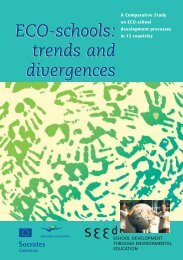External Evaluation of SEED Final Report - SEED - Schule.at
External Evaluation of SEED Final Report - SEED - Schule.at
External Evaluation of SEED Final Report - SEED - Schule.at
Create successful ePaper yourself
Turn your PDF publications into a flip-book with our unique Google optimized e-Paper software.
The complexity <strong>of</strong> theories and terms rel<strong>at</strong>ing to EE, has also proved a<br />
limit<strong>at</strong>ion in <strong>SEED</strong> activities. Notions such as ‘quality criteria’, ‘Action<br />
Research’ and ‘Educ<strong>at</strong>ion for Sustainability’ have proven difficult to<br />
transl<strong>at</strong>e into every language. Extra time is required for <strong>SEED</strong> members<br />
to come to terms with these concepts if not already familiar and to<br />
discuss with their fellow participants and members in order to gain a<br />
deeper understanding.<br />
<strong>SEED</strong> has allevi<strong>at</strong>ed this obstacle as best as possible by providing events<br />
which contain a mixture <strong>of</strong> present<strong>at</strong>ions, workshops, small group<br />
discussions, group work, project-based work, site visits and social<br />
g<strong>at</strong>herings. This has improved the networking and provided a variety <strong>of</strong><br />
means for which <strong>SEED</strong>’s aims and objectives can be conveyed.<br />
Summary <strong>of</strong> Performance in Intercultural Issues<br />
The intercultural issues, especially language have <strong>at</strong> times provided<br />
challenges for the network to achieve its aims although where this<br />
occurred they were quickly overcome by the organisers and participants.<br />
Overall the participants feel th<strong>at</strong> the cultural exchange provides more<br />
positive than neg<strong>at</strong>ive impacts and has been one <strong>of</strong> the highlights <strong>of</strong> the<br />
network.<br />
To ensure maximum particip<strong>at</strong>ion and engagement with concepts and<br />
products <strong>SEED</strong> has delivered events which contain a mixture <strong>of</strong><br />
present<strong>at</strong>ions, workshops, small group discussions, group work, projectbased<br />
work, site visits and social g<strong>at</strong>herings.<br />
Management<br />
The management <strong>of</strong> <strong>SEED</strong> has been successfully undertaken by the<br />
Ministry <strong>of</strong> Educ<strong>at</strong>ion and Training in Austria. This group has balanced<br />
the administr<strong>at</strong>ion <strong>of</strong> <strong>SEED</strong> events, correspondence with members<br />
between the events and the overall coordin<strong>at</strong>ion <strong>at</strong> <strong>SEED</strong> events.<br />
<strong>SEED</strong> facilit<strong>at</strong>es a close dialogue and better understanding between<br />
policy makers and practitioners in the educ<strong>at</strong>ional systems. <strong>SEED</strong><br />
encourages co-oper<strong>at</strong>ion among stakeholders in current, completed and<br />
prospective COMENIUS projects and associ<strong>at</strong>ed stakeholders in the field<br />
<strong>of</strong> environmental educ<strong>at</strong>ion.<br />
<strong>SEED</strong> has enhanced face-to-face communic<strong>at</strong>ion by them<strong>at</strong>ic conferences<br />
(in Austria 2002; Germany 2004 and Denmark 2005), workshops on<br />
methodology (in Hungary 2003 and Italy 2004), and combined with these<br />
several COMENIUS contact seminars. The contact seminars have been<br />
aimed <strong>at</strong> developing school partnerships and teacher educ<strong>at</strong>ion seminars<br />
under the umbrella <strong>of</strong> the overall theme<br />
Logistical difficulties experienced by practitioners and workshop planners<br />
with n<strong>at</strong>ional agencies regarding promotion, particip<strong>at</strong>ion and funding<br />
initially inhibited workshop particip<strong>at</strong>ion and outcomes. N<strong>at</strong>ional<br />
Agencies and their cooper<strong>at</strong>ion and knowledge <strong>of</strong> the <strong>SEED</strong> network,<br />
therefore plays a key role in whether member countries have a voice or<br />
get involved in the <strong>SEED</strong> projects and networks.<br />
17<br />
Internal Evalu<strong>at</strong>ors Reflections<br />
about the COMENIUS I Contact<br />
seminar October 2003: ‘It again<br />
proved manageable and helpful to have<br />
English as only working language’.<br />
Internal <strong>Evalu<strong>at</strong>ion</strong>, Helsinki<br />
Wh<strong>at</strong> have you discovered about<br />
intercultural exchanges during this<br />
workshop?<br />
KIG Member: ‘I have discovered<br />
mostly positive things. There have been<br />
some language problems, but on the<br />
other hand I have been obliged to use<br />
other expressions to make my points <strong>of</strong><br />
view to be understood and <strong>at</strong> the same<br />
time to reflect my intentions deeper. I<br />
got new ideas when talking with people<br />
doing the other projects.’<br />
Reflections on ARION 2003<br />
‘There was confusion about the working<br />
language due to the form <strong>of</strong><br />
announcement by the EU (Language <strong>of</strong><br />
the country: German, Working<br />
language: English).<br />
We wrote ”working language English”<br />
but had participants who had big<br />
difficulties with English. The organis<strong>at</strong>ion<br />
team and the ARION group managed to<br />
deal with th<strong>at</strong> s<strong>at</strong>isfactorily: The<br />
lecturers transl<strong>at</strong>ed themselves (= gave<br />
bilingual lectures) or were consecutively<br />
transl<strong>at</strong>ed, the discussion was mainly<br />
transl<strong>at</strong>ed by Johannes and Günther<br />
partly supported by the French<br />
colleague (transl<strong>at</strong>ing from English to<br />
French for the Italian colleague), by the<br />
second Italian colleague (transl<strong>at</strong>ing into<br />
Italian) and one German colleague<br />
helping from English to German.’<br />
See also Portfolio <strong>of</strong> Evidence.<br />
Management <strong>Evalu<strong>at</strong>ion</strong> Questions<br />
Q. How is the balance between <strong>SEED</strong><br />
work, i.e. research, outputs for schools<br />
and administr<strong>at</strong>ion <strong>of</strong> the project? Is<br />
<strong>SEED</strong> managing time and resources<br />
effectively?<br />
Q.Wh<strong>at</strong> opportunities are there for all<br />
countries to have a voice – or do some<br />
domin<strong>at</strong>e?<br />
Q. How does the EU influence the<br />
performance and impact <strong>of</strong> <strong>SEED</strong>?<br />
Reflections about the COMENIUS I<br />
Contact seminar December 2002<br />
The feed back <strong>of</strong> some n<strong>at</strong>ional agencies<br />
showed th<strong>at</strong> the connection with<br />
COMENIUS III was not clear and not a<br />
reason for supporting applic<strong>at</strong>ions






